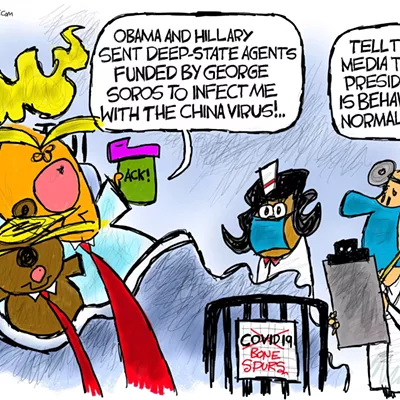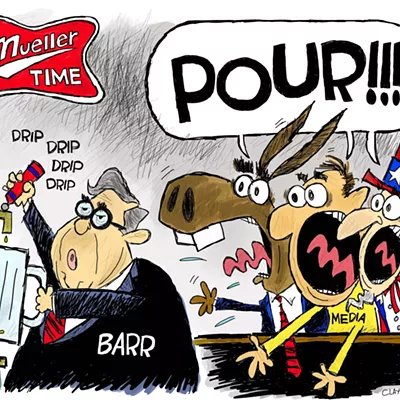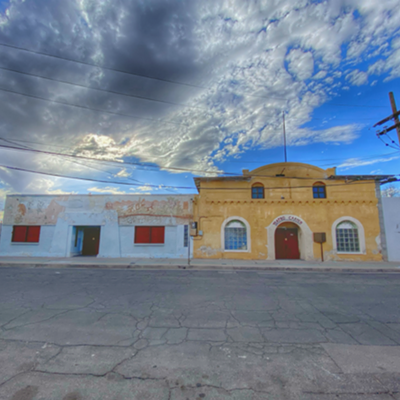We're not alone in such treatment from big brother Clear Channel, the San Antonio-based behemoth that used the Telecommunications Act of 1996 to devour station after station to build its list to more than 1,220. Las Vegas, with more rapid growth and worse traffic, also hears how things are moving on its streets and interstates from Clear Channel's Total Traffic in Phoenix. So do listeners in Albuquerque.
"That they would do traffic reports for Tucson out of Phoenix is outrageous," said John Scott Ulm, host of the mostly political John C. Scott Show on AM 990 KTKT. "It's an affront to the sensibilities of the community."
KTKT uses traffic dispatches from the local operation of Metro Media.
Greg Ritchie, Total Traffic's honcho in Phoenix, did not return repeated phone calls.
Time qualifies Ulm as an expert. He began his Tucson radio and television news career at KTKT in 1967. His three-hour talk show is in its 15th year, including the last seven at KTKT, which--even as a rock station when Scott started--had a news staff with traffic reporting. It relied on police scanners, mobile units and even a couple of off-duty cops. Wherever the traffic mayhem, KTKT had people there, or at the least got into fast contact with people there.
"It was a smaller town then, certainly, and you could get away with it, but most of the stations now have no interest in news or what's going on in Tucson," says Ulm. "It's pretty fucking sad, really. They'd rather pay some silly-ass DJ six figures to talk about blow jobs than spend money on several news reporters."
One of the Scott show's periodic guests, Sen. John McCain, R-Ariz., is attempting to clamp down on Clear Channel and others before they grow stronger than an oligopoly. Although the Federal Communications Commission recently approved measures to allow for greater concentration of media ownership, a McCain committee seeks to reverse the trend.
On the Scott show last week, and on Imus In the Morning (locally on KJLL AM 1330), McCain told the story of a Clear Channel-type response to a community emergency, a potential disaster in a small Midwestern town, after the conglomerate snapped up the stations in the area. When emergency responders and other officials attempted to contact the stations to get warnings and instructions on the air, they found no people at the stations, according to McCain. Everything aired by the stations was piped in from Clear Channel stations in cities far away.
Clear Channel has corralled in Tucson's KNST 790 AM, KTZR 1450 AM, KXEW 1600 AM , KOYT 92.9 FM, KRQQ 93.7 FM, KWFM 97.1 FM and KOHT 98.3 FM. The company is deep and wide, with control over an estimated 60 percent of all rock programming in the country, as well as control over concerts, promotions, tours--through its SFX Entertainment--and a number of bands. It has generated such revulsion and fear that a Web site, ClearChannelSucks.org, makes it its business to "educating the public" about Clear Channel.
Tucson is not without real traffic reports. Alan Kath, a talented and good-humored man with 30 years in broadcast, including half of that in Tucson, runs an increasingly seasoned crew at Metro Networks that provides traffic reports to the network television affiliates and 10 radio stations.
"We do launch a plane," Kath said. "No one else does."
Kath has high-profile Gina Corral (KVOA Channel 4), April Madison (KGUN Channel 9) and Mark Bateman (KOLD Channel 13). That trio also does radio. Metro also covers Tucson radio, including the two top-rated stations, with Kath, Lisa Dairby, James Joseph, Bonnie Keene and Steve Koonce. Keene, who can be heard on Mega, The Point and Fox Sports 1290, is the daughter of Bill Keene, who pioneered traffic reporting in Los Angeles.
"You don't need a degree in traffic reporting, but we provide training," Kath said.
Plus, they have a traffic-reporting advantage, as Kath points out: They live here and drive here. They know a short cut and the dead ends.









